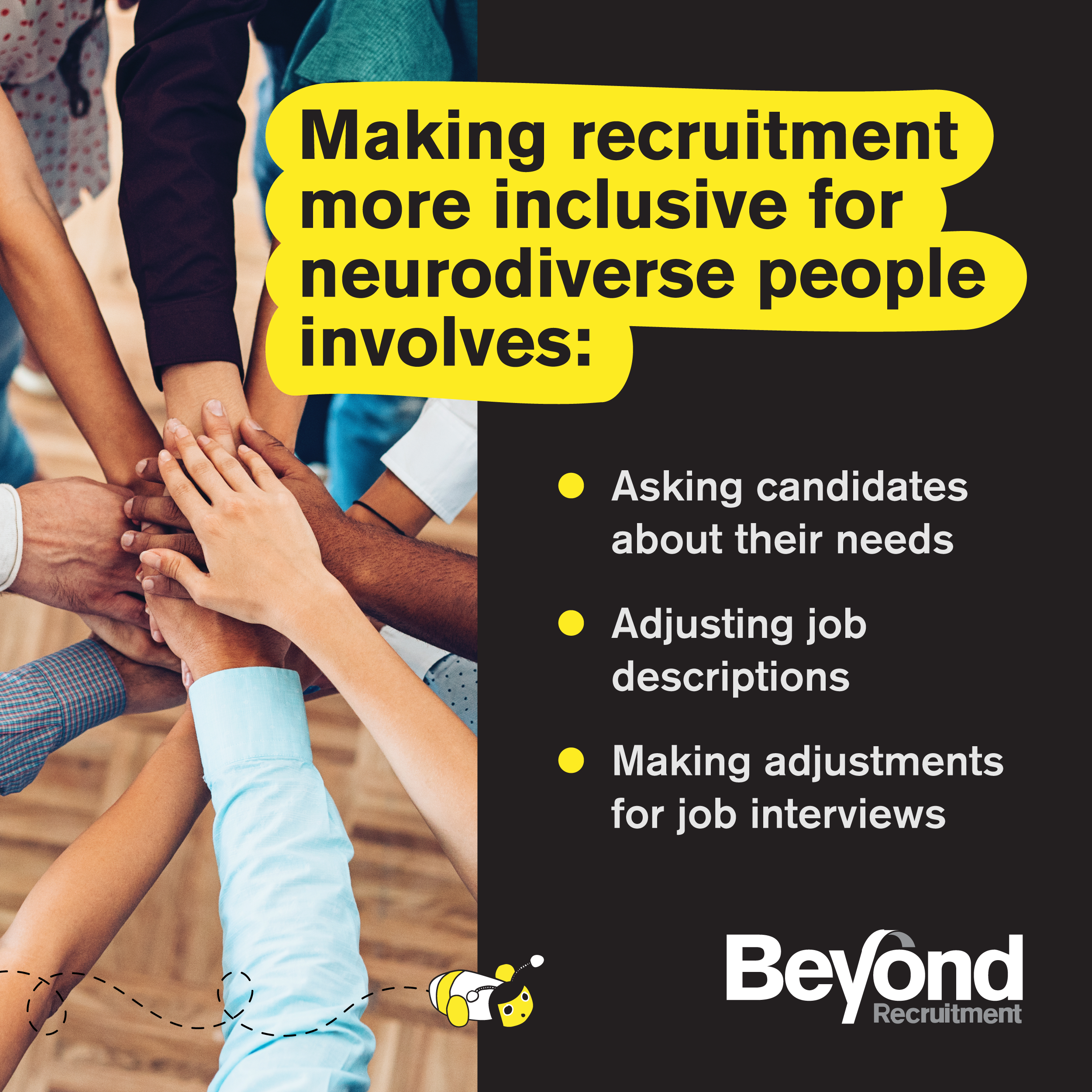Published Date: 20th March 2024
In recent years, you may have started hearing more about neurodiversity in conversations about diversity in the workplace. Neurodiversity refers to the natural variation in how our brains work, encompassing conditions like autism, ADHD, dyslexia, and more.
Recruiting and fostering neurodiverse teams is a vital part of championing diversity and inclusion efforts. It has powerful potential to create positive outcomes for people who usually face significant barriers to long-term employment. It's also a strategy that can yield numerous benefits for businesses in terms of skills.
We’ve recently engaged with Autism New Zealand to learn more about the experience of neurodiverse people in the workplace, which has been an eye-opening exercise for us.
Whilst we’re still on our journey with neurodiverse-focused hiring here at Beyond Recruitment, we do have several thoughts to share on this subject, which can hopefully inspire you to start making positive changes in your own workplace.
Neurodiverse Hiring is Person-Led
Before you begin gathering tactics and designing processes for recruiting neurodiverse people into your organisation, it’s important to take a step back and consider how ‘person-led’ your approach is.
Inclusive and equitable organisations help people feel welcomed, known, valued and pave the way for people to bring their whole, unique selves to work. This is just as true for neurodiverse people as it is for people who are not neurodiverse (sometimes referred to as neurotypical).
Just as neurotypical employees might ask for a specific accommodation at work that allows them to feel more comfortable in the office, when hiring neurodiverse candidates, the principle is the same. Being inclusive is about asking each candidate what they need to participate in your hiring process. For example, it’s not up to us to tell a hiring manager that a candidate is neurodiverse – that’s for the candidate to decide.
We are seeing candidates lead the way towards being heard more, by confidently articulating what they need to be successful in any work environment. However, others feel less inclined to share this information, so employers must be aware that each person will approach this differently.
Best Practices for Recruiting for Neurodiverse Teams
Although we urge organisations to avoid relying on checklists and instead focus on person-led recruiting, there are standard practices that can be used to make recruitment and the workplace more welcoming for neurodiverse people.
These include:
Writing Clear Job Descriptions with Inclusive Language: Make your job descriptions clear and keep them free from unnecessary jargon, wordplay or euphemisms. It’s also important to avoid adding a long list of specific requirements, which can be a high barrier.
Helping Candidates Prepare for Interviews: Job interviews are often the most difficult stage of the process for neurodiverse candidates, so it’s sensible to take extra care in this area. Give candidates a clear written outline of what to expect in the job interview.
Expanding the Scope of Sourcing: Partner with neurodiverse-focused organisations, participate in job fairs and networking events for neurodiverse individuals, and actively seek referrals from current employees. Connecting with the broader neurodiverse community is a crucial step in developing more awareness of their needs — and uncovering their hidden talent.
Training and Awareness: Train your hiring managers and existing employees to understand neurodiversity and how to support neurodiverse colleagues. Building a culture of understanding and inclusion is key.
Above all, provide individualised accommodations. Adjust your recruitment processes and materials so neurodiverse candidates can indicate what they need for a job interview and in the workplace.

Why Neurodiverse Teams Help Companies Succeed
Neurodiverse individuals often have unique skills and talents that can be invaluable in many roles. For example, some autistic people can really excel in tasks requiring attention to detail and pattern recognition, making them ideal candidates for working with data analysis.
Differently wired brains can provide fresh insights and approaches to challenges. Having a neurodiverse perspective at work can lead to innovative problem-solving and creative thinking.
As Altogether Autism reports, individuals on the autism spectrum “are often able to concentrate on one thing for long periods of time, may perform well in repetitive tasks, and have low rates of absenteeism”.
Resources for Change
Embracing neurodiversity in the workplace isn't just a box-ticking exercise; it's a strategy that can elevate diversity, equity and inclusion for employment in New Zealand as a whole.
By adopting a person-led approach to recruitment, your teams can harness the untapped potential of neurodiverse individuals and create a more competitive workforce as a result.
Neurodiverse people bring so many skills, strengths and abilities to the table. Seeing how organisations, including Beyond Recruitment, are working hard at becoming more inclusive, we feel excited for the future.
We hope that even more organisations will start recognising the unique talents and perspectives neurodiverse individuals can bring to work and offer them the flexibility they need to succeed.
Ready to follow Beyond Recruitment’s lead? Here are resources to access for education on developing a neurodiverse workforce:
For help in developing a diverse and inclusive workplace, or with designing a recruitment process that supports neurodiverse talent, contact our team today.



.png)

